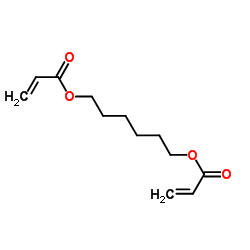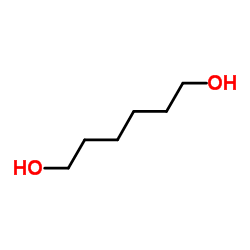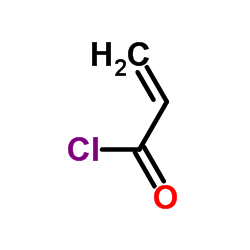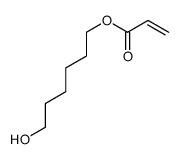13048-33-4
| 中文名 | 1,6-己二醇二丙烯酸酯 |
|---|---|
| 英文名 | Hexamethylene diacrylate |
| 中文别名 |
1.6-已二醇二丙烯酸酯
1,6-双(丙烯酰氧基)己烷 1,4-己二醇二丙烯酸酯 二丙烯酸1,6-己二醇酯 二丙烯酸-1,6-己二醇酯 |
| 英文别名 |
hexane-1,6-diyl bisprop-2-enoate
Hexane-1,6-diyl bisacrylate EINECS 235-921-9 Hexane-1,6-diyl diacrylate 1,6-Hexanediyl bisacrylate 1,6-Bis(acryloyloxy)hexane Hexamethylene Glycol Diacrylate 2-Propenoic acid, 1,6-hexanediyl ester 1,6-Hexanediol diacrylate 6-prop-2-enoyloxyhexyl prop-2-enoate MFCD00008631 |
| 密度 | 1.0±0.1 g/cm3 |
|---|---|
| 沸点 | 302.1±25.0 °C at 760 mmHg |
| 熔点 | 6°C |
| 分子式 | C12H18O4 |
| 分子量 | 226.269 |
| 闪点 | 142.3±21.6 °C |
| 精确质量 | 226.120514 |
| PSA | 52.60000 |
| LogP | 2.96 |
| 外观性状 | 透明黄色液体 |
| 蒸汽密度 | >1 (vs air) |
| 蒸汽压 | 0.0±0.6 mmHg at 25°C |
| 折射率 | 1.454 |
| 储存条件 | 常温密闭避光,通风干燥处 |
| 稳定性 | 常温常压下稳定 避免的物料 氧化物 水分/潮湿 酸 光 热 |
| 水溶解性 | 水溶性:实际上不溶;可溶于:丙酮 |
| 分子结构 | 1、 摩尔折射率:60.64 2、 摩尔体积(m3/mol):223.7 3、 等张比容(90.2K):537.0 4、 表面张力(dyne/cm):33.1 5、 极化率(10-24cm3):24.04 |
| 计算化学 | 1.疏水参数计算参考值(XlogP):2.6 2.氢键供体数量:0 3.氢键受体数量:4 4.可旋转化学键数量:11 5.互变异构体数量:无 6.拓扑分子极性表面积52.6 7.重原子数量:16 8.表面电荷:0 9.复杂度:219 10.同位素原子数量:0 11.确定原子立构中心数量:0 12.不确定原子立构中心数量:0 13.确定化学键立构中心数量:0 14.不确定化学键立构中心数量:0 15.共价键单元数量:1 |
| 更多 | 1. 性状:纯净液体 2. 密度(g/mL, 25 ℃ ):1.01 3. 相对蒸汽密度(g/mL,空气=1):未确定 4. 熔点(ºC):6 5. 沸点(ºC,常压):295 6. 沸点(ºC,30mmHg):未确定 7. 折射率:1.456 8. 闪点(ºC):>110 9. 比旋光度(º):未确定 10. 自燃点或引燃温度(ºC):未确定 11. 蒸气压(20ºC):未确定 12. 饱和蒸气压(kPa,60ºC):未确定 13. 燃烧热(KJ/mol):未确定 14. 临界温度(ºC):未确定 15. 临界压力(KPa):未确定 16. 油水(辛醇/水)分配系数的对数值:未确定 17. 爆炸上限(%,V/V):未确定 18. 爆炸下限(%,V/V):未确定 19. 溶解性:未确定 |
|
SECTION 1: Identification of the substance/mixture and of the company/undertaking Product identifiers Product name: 1,6-Hexanediol diacrylate REACH No.: A registration number is not available for this substance as the substance or its uses are exempted from registration, the annual tonnage does not require a registration or the registration is envisaged for a later registration deadline.
CAS-No.: 13048-33-4 Relevant identified uses of the substance or mixture and uses advised against Identified uses: Laboratory chemicals, Manufacture of substances SECTION 2: Hazards identification Classification of the substance or mixture Classification according to Regulation (EC) No 1272/2008 Skin irritation (Category 2), H315 Eye irritation (Category 2), H319 Skin sensitisation (Category 1), H317 For the full text of the H-Statements mentioned in this Section, see Section 16. Classification according to EU Directives 67/548/EEC or 1999/45/EC Xi IrritantR36/38 R43 For the full text of the R-phrases mentioned in this Section, see Section 16. Label elements Labelling according Regulation (EC) No 1272/2008 Pictogram Signal wordWarning Hazard statement(s) H315Causes skin irritation. H317May cause an allergic skin reaction. H319Causes serious eye irritation. Precautionary statement(s) P280Wear protective gloves. P305 + P351 + P338IF IN EYES: Rinse cautiously with water for several minutes. Remove contact lenses, if present and easy to do. Continue rinsing. Supplemental Hazardnone Statements Other hazards This substance/mixture contains no components considered to be either persistent, bioaccumulative and toxic (PBT), or very persistent and very bioaccumulative (vPvB) at levels of 0.1% or higher. SECTION 3: Composition/information on ingredients Substances Synonyms: HDODA Formula: C12H18O4 Molecular weight: 226,27 g/mol CAS-No.: 13048-33-4 EC-No.: 235-921-9 Index-No.: 607-109-00-8 Hazardous ingredients according to Regulation (EC) No 1272/2008 ComponentClassificationConcentration Hexamethylene diacrylate CAS-No.13048-33-4Skin Irrit. 2; Eye Irrit. 2; Skin<= 100 % EC-No.235-921-9Sens. 1; H315, H317, H319 Index-No.607-109-00-8 Hazardous ingredients according to Directive 1999/45/EC ComponentClassificationConcentration Hexamethylene diacrylate CAS-No.13048-33-4Xi, R36/38 - R43<= 100 % EC-No.235-921-9 Index-No.607-109-00-8 For the full text of the H-Statements and R-Phrases mentioned in this Section, see Section 16 SECTION 4: First aid measures Description of first aid measures General advice Consult a physician. Show this safety data sheet to the doctor in attendance. If inhaled If breathed in, move person into fresh air. If not breathing, give artificial respiration. Consult a physician. In case of skin contact Wash off with soap and plenty of water. Consult a physician. In case of eye contact Rinse thoroughly with plenty of water for at least 15 minutes and consult a physician. If swallowed Never give anything by mouth to an unconscious person. Rinse mouth with water. Consult a physician. Most important symptoms and effects, both acute and delayed The most important known symptoms and effects are described in the labelling (see section 2.2) and/or in section 11 Indication of any immediate medical attention and special treatment needed No data available SECTION 5: Firefighting measures Extinguishing media Suitable extinguishing media Use water spray, alcohol-resistant foam, dry chemical or carbon dioxide. Special hazards arising from the substance or mixture Carbon oxides Advice for firefighters Wear self-contained breathing apparatus for firefighting if necessary. Further information No data available SECTION 6: Accidental release measures Personal precautions, protective equipment and emergency procedures Use personal protective equipment. Avoid breathing vapours, mist or gas. Ensure adequate ventilation. For personal protection see section 8. Environmental precautions Do not let product enter drains. Methods and materials for containment and cleaning up Soak up with inert absorbent material and dispose of as hazardous waste. Keep in suitable, closed containers for disposal. Reference to other sections For disposal see section 13. SECTION 7: Handling and storage Precautions for safe handling Avoid contact with skin and eyes. Avoid inhalation of vapour or mist. For precautions see section 2.2. Conditions for safe storage, including any incompatibilities Store in cool place. Keep container tightly closed in a dry and well-ventilated place. Light sensitive. Storage class (TRGS 510): Combustible liquids Specific end use(s) Apart from the uses mentioned in section 1.2 no other specific uses are stipulated SECTION 8: Exposure controls/personal protection Control parameters Components with workplace control parameters Exposure controls Appropriate engineering controls Handle in accordance with good industrial hygiene and safety practice. Wash hands before breaks and at the end of workday. Personal protective equipment Eye/face protection Face shield and safety glasses Use equipment for eye protection tested and approved under appropriate government standards such as NIOSH (US) or EN 166(EU). Skin protection Handle with gloves. Gloves must be inspected prior to use. Use proper glove removal technique (without touching glove's outer surface) to avoid skin contact with this product. Dispose of contaminated gloves after use in accordance with applicable laws and good laboratory practices. Wash and dry hands. The selected protective gloves have to satisfy the specifications of EU Directive 89/686/EEC and the standard EN 374 derived from it. Full contact Material: Nitrile rubber Minimum layer thickness: 0,4 mm Break through time: 480 min Material tested:Camatril® (KCL 730 / Z677442, Size M) Splash contact Material: Nitrile rubber Minimum layer thickness: 0,2 mm Break through time: 66 min Material tested:Dermatril® P (KCL 743 / Z677388, Size M) data source: KCL GmbH, D-36124 Eichenzell, phone +49 (0)6659 87300 test method: EN374 If used in solution, or mixed with other substances, and under conditions which differ from EN 374, contact the supplier of the CE approved gloves. This recommendation is advisory only and must be evaluated by an industrial hygienist and safety officer familiar with the specific situation of anticipated use by our customers. It should not be construed as offering an approval for any specific use scenario. Body Protection Complete suit protecting against chemicals, The type of protective equipment must be selected according to the concentration and amount of the dangerous substance at the specific workplace. Respiratory protection Where risk assessment shows air-purifying respirators are appropriate use a full-face respirator with multi-purpose combination (US) or type ABEK (EN 14387) respirator cartridges as a backup to engineering controls. If the respirator is the sole means of protection, use a full-face supplied air respirator. Use respirators and components tested and approved under appropriate government standards such as NIOSH (US) or CEN (EU). Control of environmental exposure Do not let product enter drains. SECTION 9: Physical and chemical properties Information on basic physical and chemical properties a) AppearanceForm: liquid Colour: colourless b) OdourNo data available c) Odour ThresholdNo data available d) pHNo data available e) Melting point/freezingMelting point/freezing point: 5 °C point f) Initial boiling point and 107 °C at 0,3 hPa boiling range g) Flash point113 °C - closed cup h) Evaporation rateNo data available i) Flammability (solid, gas) No data available j) Upper/lowerNo data available flammability or explosive limits k) Vapour pressure< 0,01 hPa at 20 °C l) Vapour density7,81 - (Air = 1.0) m) Relative density1,01 g/cm3 at 25 °C n) Water solubility0,36 g/l at 20 °C - slightly soluble o) Partition coefficient: n- log Pow: 2,81 at 25 °C octanol/water p) Auto-ignition235 °C at 1.013,25 hPa temperature q) DecompositionNo data available temperature r) ViscosityNo data available s) Explosive propertiesNo data available t) Oxidizing propertiesNo data available Other safety information Relative vapour density 7,81 - (Air = 1.0) SECTION 10: Stability and reactivity Reactivity No data available Chemical stability Stable under recommended storage conditions. Possibility of hazardous reactions No data available Conditions to avoid Keep away from direct sunlight. Incompatible materials Oxidizing agentsStrong bases, Strong oxidizing agents, Peroxides, Copper, Iron oxides Hazardous decomposition products Other decomposition products - No data available In the event of fire: see section 5 SECTION 11: Toxicological information Information on toxicological effects Acute toxicity LD50 Oral - Rat - 5.000 mg/kg LC0 Inhalation - Rat - male and female - 7 h - 0,41 mg/l LD50 Dermal - Rabbit - 3.650 mg/kg (OECD Test Guideline 402) Skin corrosion/irritation Skin - Rabbit Result: Irritating to skin. - 4 h (OECD Test Guideline 404) Serious eye damage/eye irritation No data available Respiratory or skin sensitisation Maximisation Test (GPMT) - Guinea pig Result: May cause sensitisation by skin contact. (OECD Test Guideline 406) Germ cell mutagenicity Mouse lymphocyte Result: negative Carcinogenicity IARC:No component of this product present at levels greater than or equal to 0.1% is identified as probable, possible or confirmed human carcinogen by IARC. Reproductive toxicity No data available Specific target organ toxicity - single exposure No data available Specific target organ toxicity - repeated exposure No data available Aspiration hazard No data available Additional Information Repeated dose toxicity - Rat - male and female - Oral - No observed adverse effect level - 250 mg/kg RTECS: AT1430000 burning sensation, Cough, wheezing, laryngitis, Shortness of breath, Headache, Nausea, Vomiting, To the best of our knowledge, the chemical, physical, and toxicological properties have not been thoroughly investigated. SECTION 12: Ecological information Toxicity Toxicity to fishstatic test LC50 - Leuciscus idus (Golden orfe) - 4,6 - 10 mg/l - 96 h (DIN 38412) Toxicity to daphnia and static test EC50 - Daphnia magna (Water flea) - 2,6 mg/l - 48 h other aquatic invertebrates Toxicity to algaestatic test EC50 - Desmodesmus subspicatus (Scenedesmus subspicatus) - 1,5 mg/l - 72 h Toxicity to bacteriaRespiration inhibition EC50 - Sludge Treatment - ca. 270 mg/l - 30 min (OECD Test Guideline 209) Persistence and degradability Biodegradabilityaerobic - Exposure time 28 d Result: 60 - 70 % - Readily biodegradable. (OECD Test Guideline 310) Bioaccumulative potential No data available Mobility in soil No data available Results of PBT and vPvB assessment This substance/mixture contains no components considered to be either persistent, bioaccumulative and toxic (PBT), or very persistent and very bioaccumulative (vPvB) at levels of 0.1% or higher. Other adverse effects No data available SECTION 13: Disposal considerations Waste treatment methods Product Offer surplus and non-recyclable solutions to a licensed disposal company. Contaminated packaging Dispose of as unused product. SECTION 14: Transport information UN number ADR/RID: -IMDG: -IATA: - UN proper shipping name ADR/RID: Not dangerous goods IMDG: Not dangerous goods IATA:Not dangerous goods Transport hazard class(es) ADR/RID: -IMDG: -IATA: - Packaging group ADR/RID: -IMDG: -IATA: - Environmental hazards ADR/RID: noIMDG Marine pollutant: noIATA: no Special precautions for user No data available SECTION 15: Regulatory information This safety datasheet complies with the requirements of Regulation (EC) No. 1907/2006. Safety, health and environmental regulations/legislation specific for the substance or mixture No data available Chemical Safety Assessment For this product a chemical safety assessment was not carried out SECTION 16: Other information Full text of H-Statements referred to under sections 2 and 3. Eye Irrit.Eye irritation H315Causes skin irritation. H317May cause an allergic skin reaction. H319Causes serious eye irritation. Skin Irrit.Skin irritation Skin Sens.Skin sensitisation Full text of R-phrases referred to under sections 2 and 3 XiIrritant R36/38Irritating to eyes and skin. R43May cause sensitisation by skin contact. Further information Copyright 2014 Co. LLC. License granted to make unlimited paper copies for internal use only. The above information is believed to be correct but does not purport to be all inclusive and shall be used only as a guide. The information in this document is based on the present state of our knowledge and is applicable to the product with regard to appropriate safety precautions. It does not represent any guarantee of the properties of the product. Corporation and its Affiliates shall not be held liable for any damage resulting from handling or from contact with the above product. See and/or the reverse side of invoice or packing slip for additional terms and conditions of sale. |
|
毒理学数据: 1. 急性毒性:大鼠口服LD50: 5gm /kg;兔子皮肤LD50:3600uL/kg; 2. 皮肤眼睛刺激数据:兔子皮肤标准刺激测试:500 mg/24HREACTION SEVERITY : Severe 3. 其他多剂量毒性数据:兔子皮肤TDLo: 3 gm /kg/2W-I 主要的刺激性影响: 在皮肤上面:刺激皮肤和粘膜 在眼睛上面:刺激的影响 致敏作用:通过皮肤接触可能造成敏化作用 生态学数据: 通常对水体是稍微有害的,不要将未稀释或大量产品接触地下水,水道或污水系统,未经政府许可勿将材料排入周围环境。 CHEMICAL IDENTIFICATION
HEALTH HAZARD DATAACUTE TOXICITY DATA
|
| 符号 |

GHS07 |
|---|---|
| 信号词 | Warning |
| 危害声明 | H315-H317-H319 |
| 警示性声明 | P280-P305 + P351 + P338 |
| 个人防护装备 | Faceshields;full-face respirator (US);Gloves;Goggles;multi-purpose combination respirator cartridge (US);type ABEK (EN14387) respirator filter |
| 危害码 (欧洲) | Xi:Irritant; |
| 风险声明 (欧洲) | R36/38;R43 |
| 安全声明 (欧洲) | S39 |
| 危险品运输编码 | UN 3082 9/PG 3 |
| WGK德国 | 2 |
| RTECS号 | AT1430000 |
| 危险类别 | 9.0 |
| 海关编码 | 2916190090 |
|
~32% 
13048-33-4 |
| 文献:Stenlake; Waigh; Dewar; et al. European Journal of Medicinal Chemistry, 1981 , vol. 16, # 6 p. 515 - 524 |
|
~% 
13048-33-4 |
| 文献:Journal of Molecular Catalysis B: Enzymatic, , vol. 62, # 1 p. 80 - 89 |
|
~% 
13048-33-4 |
| 文献:Journal of pharmaceutical sciences, , vol. 63, # 7 p. 1162 - 1163 |
|
~% 
13048-33-4 |
| 文献:Journal of pharmaceutical sciences, , vol. 63, # 7 p. 1162 - 1163 |
| 上游产品 3 | |
|---|---|
| 下游产品 0 | |
| 海关编码 | 2916190090 |
|---|---|
| 中文概述 | 2916190090 其他不饱和无环一元羧酸(包括其酸酐、酰卤化物,过氧化物和过氧酸以及它们的衍生物)。监管条件:AB(入境货物通关单,出境货物通关单)。增值税率:17.0%。退税率:9.0%。最惠国关税:6.5%。普通关税:30.0% |
| 申报要素 | 品名, 成分含量, 用途, 丙烯酸、丙烯酸盐或酯应报明包装 |
| 监管条件 | A.入境货物通关单 B.出境货物通关单 |
| 检验检疫 | R.进口食品卫生监督检验 S.出口食品卫生监督检验 M.进口商品检验 N.出口商品检验 |
| Summary | 2916190090 unsaturated acyclic monocarboxylic acids, their anhydrides, halides, peroxides, peroxyacids and their derivatives。supervision conditions:AB(certificate of inspection for goods inward,certificate of inspection for goods outward)。VAT:17.0%。tax rebate rate:9.0%。MFN tariff:6.5%。general tariff:30.0% |






